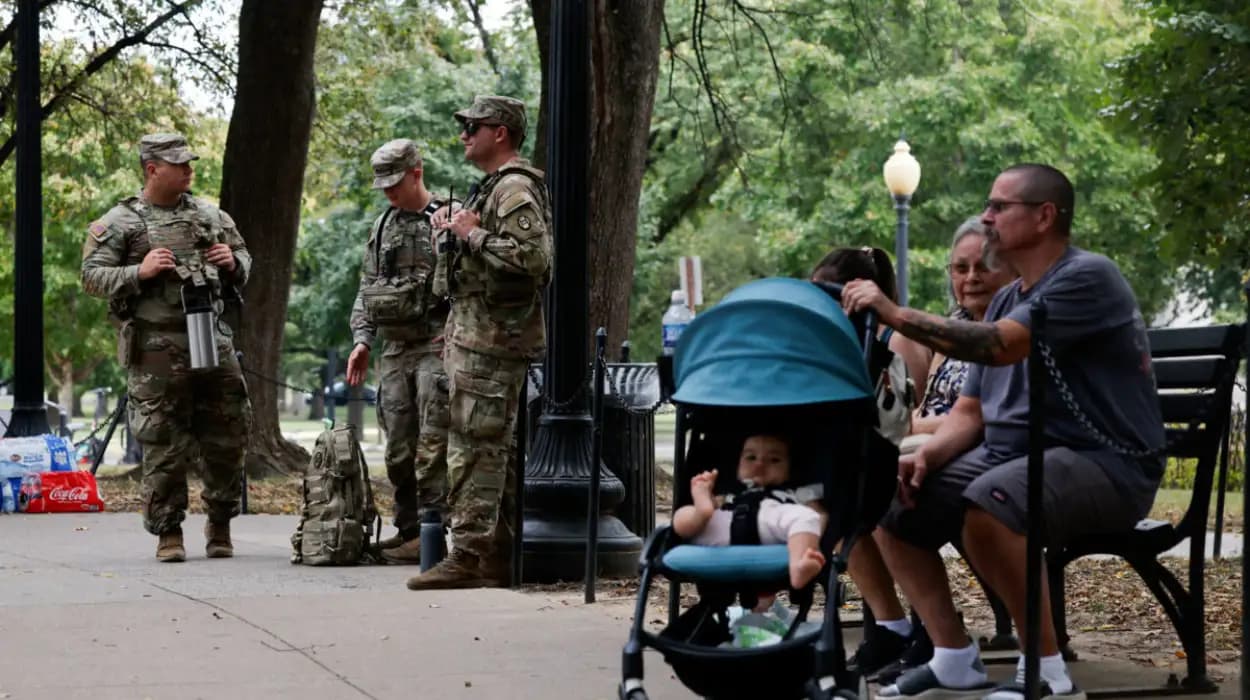Summary
- National Guard troops deployed in US cities for crime, immigration enforcement.
- Started in Los Angeles June 2025, expanded to Washington, D.C. in August.
- Plans to deploy to Chicago, Baltimore, New York, Oakland, and others.
- Deployments face legal challenges over Posse Comitatus Act restrictions.
President Donald Trump is rapidly putting his idea of the military as an all-powerful instrument for his policy objectives into practice.
Experts believe it is redefining the role of the world's most powerful military and its interaction with the American public. Presidents have rarely walked this path outside of times of war.
However, other Republicans in Congress, which is where authorization for such actions is meant to come from, have mostly supported Trump as he has drastically increased his use of military force.
As he increases plans to send soldiers to New Orleans, Baltimore, and Chicago, that gives the president a lot of leeway.
“If I were one of those mayors, I’d be glad to have the help,”
said Sen. Roger Wicker, R-Miss., the chair of the Senate Armed Services Committee, speaking from a Capitol building where National Guard troops were patrolling the surrounding city.
“I think the big city Democrats are really making a mistake. I think they’re being tone deaf.”
Lawmakers from Louisiana, a red state that surrounds politically blue New Orleans, said it was a great idea for National Guard troops to go there next.
“New Orleans, like most Democrat-run cities, has a high crime rate, so it would be helpful,”
House Speaker Mike Johnson, a Louisiana Republican, told The Associated Press.
Sen. John Kennedy, R-La., agreed:
“We need all the help we can get. I’m delighted to bring in the National Guard.”
In recent years, Republicans have achieved political success by concentrating on the problem of crime. According to a recent survey conducted by the AP-NORC Center for Public Affairs Research, 81% of Americans believe that crime is a "major problem" in big cities. This includes over seven out of ten Democrats, almost all Republicans, and around three-quarters of independents.
Nonetheless, data indicates that crime is declining nationwide, with some areas recording 30-year lows.
National Guard forces were previously only used on American land in extreme situations, including natural disasters or when local authorities were overburdened by disorder or civil disturbance. Presidents have seldom ever employed the soldiers to enforce the law.
The Pullman strike in Chicago in 1894, the Civil Rights movement's efforts to achieve desegregation in the South, and the deadly rioting in 1992 following police officers' violent beating of motorist Rodney King and their acquittal on state charges are all notable examples.
Trump's crime goal is unique, according to experts, because he isn't addressing a specific catastrophe. Instead, Trump is utilizing the military to carry out his domestic goals, whether that means ordering National Guard members to be prepared for law enforcement tasks, bolstering military forces at the U.S.-Mexico border, or deploying military planes for deportation flights.
“All of these things indicate an administration that is making a broad, concerted effort to insert the military into civilian law enforcement in a way and on a scale that has no precedent in American history,”
said Joseph Nunn, an attorney at the Brennan Center’s Liberty and National Security Program.
Trump says he has the “right” to send National Guard troops to the cities, even over the objections of state governors.
“I’m the president of the United States. If I think our country is in danger — and it is in danger in these cities — I can do it,”
he said this past week.
In accordance with its constitutional responsibilities, Congress has established legislation that specifies the conditions under which the National Guard may be used domestically. However, the Republican-controlled Congress has done nothing as Trump has pushed the boundaries of those laws. Rather, any restrictions on Trump's maximalist approach to the presidency have been left to the courts.
Following days of protests over immigration raids, a federal judge last week found that the Trump administration "willfully" violated the Posse Comitatus Act, a nearly 150-year-old federal law that restricts the role of the U.S. military in domestic law enforcement, when he deployed National Guard troops to the Los Angeles area in early June.
According to Andrew Wiest, co-founder of the Center for the Study of the National Guard at the University of Southern Mississippi, the authors of the Constitution were attempting to prevent just that kind of usage of the National Guard.
The fledgling country had recently been through a war of independence, which was brought on by the British military using the colony as a police force. As a result, its early leaders were reluctant to provide the president excessive authority over the military. Since then, presidents have had considerable authority over the military, which were once state-based militias.
“This is another one of those pendulum moments where the Guard will become more federal or maybe it will swing back in the other direction,”
Wiest said.
“But since the founding of the Republic, it’s been swinging towards the federal side.”
What legal limits apply to using the National Guard for local policing?
This law, which dates back to 1878, prohibits the U.S. military, including federalized National Guard troops, from engaging directly in civilian law enforcement without express authority from either Congress or the Constitution; it aims to clearly delineate and separate military functions from police functions.
National Guard units (not federalized) are able to provide a legal officer of the law to do tasks like policing and crowd control, assuming any such authority exists within their home state; generally, governors control national guard units unless they have been federally activated.
The federal government can call National Guard troops into federal service (Title 10) subject to the restrictions under the PCA but troops under a Title 32 status stay under state control but are federally funded and can provide assistance to law enforcement without violating the PCA.

